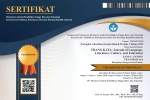Representation of Discrimination in the Animated Movie "Zootopia" (2016): John Fiske's Semiotic Analysis
DOI:
https://doi.org/10.54923/jllce.v5i2.155Keywords:
Discrimination, semiotic, representation, Zootopia, John Fiske, animated filmAbstract
This study explores the representation of discrimination in the animated film Zootopia through a semiotic analysis based on John Fiske's three levels of codes: reality, representation, and ideology. The research aims to identify how visual and narrative elements convey ideological messages about social inequality, prejudice, and systemic bias. At the reality level, discrimination is depicted through observable details such as clothing, physical appearance, gestures, and speech patterns. These elements highlight the unequal treatment of characters based on species, size, gender, and class—revealing how social roles are visually and culturally constructed. At the representation level, these real-world cues are translated into specific character interactions and storylines, such as Judy Hopps' struggle for acceptance as a rabbit police officer or Mayor Lionheart's domination over Assistant Mayor Bellwether. These scenes expose the mechanisms by which stereotypes and biases are perpetuated in society. At the ideological level, the film critiques hierarchical power structures and the symbolic markers that maintain social divisions—such as clothing, spatial segregation, and occupational roles. The findings reveal that Zootopia not only reflects existing societal norms but also challenges viewers to question and resist prejudice and discrimination. Through this layered analysis, the study concludes that Zootopia is a powerful medium for raising awareness about discrimination, encouraging audiences to reflect on issues of diversity, privilege, and social justice in both fictional and real-world contexts.
Downloads
References
Behera, P. (2024). A Framework of Semiotics Theory to Understand the Signs and Their Meaning in Society. International Journal of Arts Architecture & Design, 2(1), 77-83. doi.org/10.62030/2024JanuaryArticle6
Bush, J., & Johnston, P. (2016). Zootopia [Film]. Disney Animated Canon.
Caviola, L., Everett, J. A., & Faber, N. S. (2019). The moral standing of animals: Towards a psychology of speciesism. Journal of personality and social psychology, 116(6), 1011.
Devyana, N., & Nugroho, A. (2024). An Analysis Of Discrimination And Its Effect In “Elemental”(2023) Movie. International Journal of Research on English Teaching and Applied Linguistics, 5(1), 42-52. https://doi.org/10.30863/ijretal.v5i1.6586
Dovidio, J. F., Hewstone, M., Glick, P., & Esses, V. M. (2010). Prejudice, stereotyping and discrimination: Theoretical and empirical overview. Prejudice, stereotyping and discrimination, 12, 3-28.
Ellis, B. H., MacDonald, H. Z., Klunk‐Gillis, J., Lincoln, A., Strunin, L., & Cabral, H. J. (2010). Discrimination and mental health among Somali refugee adolescents: the role of acculturation and gender. American Journal of Orthopsychiatry, 80(4), 564.
Fiske, J. (1985). The semiotics of television. Critical Studies in Mass Communication, 2(2), 176–183. https://doi.org/10.1080/15295038509360076
Fiske, J. (1987). Television Culture. Methuen: London.
George, E., Martin, J., & Van Ho, T. (2020). Reckoning: A dialogue about racism, antiracists, and business & human rights. Wash. Int'l LJ, 30, 171.
Grande, L. A. (2017). Speciesism and Carnism in Media Animal Consumption in TV and Film.
Hall, S. (1997). The spectacle of the other. Representation: Cultural representations and signifying practices, 7, 223-290.
Jhally, S., & Lewis, J. (1992). Enlightened Racism: The Cosby Show, Audiences, and the Myth of the American Dream. San Francisco, CA: Westview Press.
Kemmerer, L. (Ed.). (2011). Sister species: Women, animals and social justice. University of Illinois Press.
Muqoddas, A., & Hasyim, N. (2016). Representasi Anti Diskriminasi pada Film Kartun 3D Zootopia (Kajian Semiotika Roland Barthes). ANDHARUPA: Jurnal Desain Komunikasi Visual & Multimedia, 2(2), 151-166.
Syaukat, R., & Imanjaya, E. (2011). Film sebagai Media Social Marketing: Yasmin Ahmad Berjualan Ide Multikulturalisme. Humaniora, 2(1), 634-642.
Vega, A. N. (2024). " Remember Me": A Narrative Analysis on Latino Representation in Disney's Coco and Encanto (Master's thesis, Brigham Young University).
Waruwu, M. (2024). Pendekatan penelitian kualitatif: Konsep, prosedur, kelebihan dan peran di bidang pendidikan. Afeksi: Jurnal Penelitian Dan Evaluasi Pendidikan, 5(2), 198-211.
Yufandar, B. T. (2016). Representasi Ras Kulit Hitam dan Kulit Putih dalam Film “The Avengers” (Doctoral dissertation, Petra Christian University).
Downloads
Published
How to Cite
Issue
Section
License
Copyright (c) 2025 Alvina Putri Murdiyanti, Yeny Prastiwi

This work is licensed under a Creative Commons Attribution-ShareAlike 4.0 International License.





